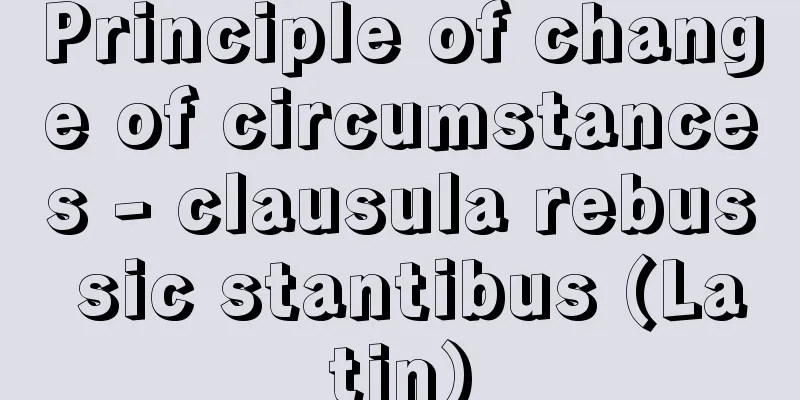Principle of change of circumstances - clausula rebus sic stantibus (Latin)

|
It is an implicit contract that all contracts are based on the circumstances at the time of their conclusion, and if there is a significant change in the circumstances at the time of their conclusion, the principle that the contract can be terminated unilaterally is considered to be an inherent legal restriction in contracts. It is said to have originated in Roman law, but its clear origin is canon law (church law) that developed in the 12th and 13th centuries, and it was established as the "principle of changed circumstances" in civil law. This principle was also introduced in international law as a reason for the termination of treaties, and in 18th century treaties, a "non-changed circumstances clause" was inserted when the treaty was concluded. However, the insertion of this clause was no longer practiced, and the abuse of this principle to unilaterally terminate treaties became a problem due to conflicts of interest between the parties to the treaty in the international community. There were cases in which the application of this principle was denied (London Declaration of 1871), but its application was recognized in Article 62 of the Vienna Convention on the Law of Treaties (which came into force in 1980). [Sakutaro Tsutsugi] Under civil lawIf the circumstances on which a contract was formed change drastically (for example, if the value of money falls drastically due to inflation), maintaining the validity of the contract may result in a serious breach of good faith and fairness. In such cases, it becomes necessary to allow the validity of the contract to be changed or abolished. This is the principle of changed circumstances. The Latin phrase "clausula rebus sic stantibus" means "a contract if the circumstances remain the same," but the opposite principle of "pacta sunt servanda" ("contracts must be kept") has also been recognized since ancient times, and the two principles must be harmonized. There is no general provision on the principle of changed circumstances in Japanese civil law, but there are individual provisions that can be seen as manifestations of the principle of changed circumstances (Civil Code Articles 589, 609, 628, etc.). In addition, precedents have in the past allowed landlords to unilaterally request rent increases in cases of sudden increases in land prices or public taxes and charges, and this has been explained as a case in point of the principle of changed circumstances (however, there are now provisions in place: Land and House Lease Law, Articles 11 and 32). [Takahisa Awaji] [References] | | | |Source: Shogakukan Encyclopedia Nipponica About Encyclopedia Nipponica Information | Legend |
|
すべて契約は、締結当時の事情に基礎をもって成立することを暗黙の約款としており、その締結時の事情に著しい変化が生じた場合、その契約を一方的に終了せしめうるとする原則をいい、契約に内在する法的制約とされる。ローマ法にその起源があるといわれるが、明確な起源は、12、13世紀に発達したカノン法(教会法)であり、民法上「事情変更の原則」として確立した。国際法上でも、条約の終了原因としてこの原則が導入され、18世紀の条約のなかには、条約の締結にあたり「事情不変更約款」が挿入された。しかしその後、この約款を挿入する実行がなくなり、また国際社会での条約当事国の利害の対立などから、条約を一方的に終了できるこの原則の乱用が問題とされていた。そして、適用を否定する事例(1871年のロンドン宣言)も生じたが、「条約法に関するウィーン条約」(1980年発効)第62条では適用が認められた。 [經塚作太郎] 民法上契約などの成立にあたってその基礎とした事情がのちに著しく変動した場合(たとえばインフレによって貨幣価値が著しく下がった場合)には、その契約の効力をそのまま維持することは場合によって著しく信義公平に反する結果となる。そこで、そのような場合には契約の効力の変更や廃棄を認める必要が生じる。これが事情変更の原則である。ラテン語のclausula rebus sic stantibusは「事情がもし同じならばという約款」を意味するが、これと正反対のpacta sunt servanda「契約は守られねばならない」という原則も古来認められており、両者の調和が必要とされる。日本の民法上は事情変更の原則に関する一般的規定は存在しないが、個別的には事情変更の原則の現れとみることのできる規定が存在する(民法589条、609条、628条など)。また、かつて判例は、地価急騰、公租公課の激増の場合に、貸し主の一方的値上げの請求を認めたが、これは事情変更の原則の適例として説明されている(ただし、現在では規定がある。借地借家法11条、32条)。 [淡路剛久] [参照項目] | | | |出典 小学館 日本大百科全書(ニッポニカ)日本大百科全書(ニッポニカ)について 情報 | 凡例 |
<<: Practice in practice - jijomaren
>>: Market analysis - market analysis
Recommend
Khidash (English spelling)
...Arabic sources refer to it as Khurramiya or Kh...
Hekinan [city] - Hekinan
A city in southern Aichi Prefecture facing Chita B...
All the Kingsmen
...A black and white film. Produced, written, and...
Swami Haridas (English spelling)
…He was given the honorific name of “Miyaan” amon...
Ammonium fluoride (Fuka ammonium)
There are normal salts and hydrogen salts (ammoniu...
Nanna
…Babylonian moon goddess. In Sumer she was called...
Laser geodesy - Laser geodesy
A method of measuring the distance between two poi...
Metallic arsenic
… [nature] It is sublimable and has two or three ...
New Russian
...Russian finally began to walk the path to deve...
Weiyuan
A Chinese thinker in the late Qing dynasty. His p...
Fee - Kanryo
In the Middle Ages, rice fees and fees were paid i...
Die Fackel
In this sense, Krauss's role can be said to b...
Bromley, C.
…He was strongly influenced by Boehme, and his vi...
Faucet - Snakehead
〘 noun 〙 (from its resemblance to a snake's mo...
holothurin
...There are also cases where crabs live symbioti...









